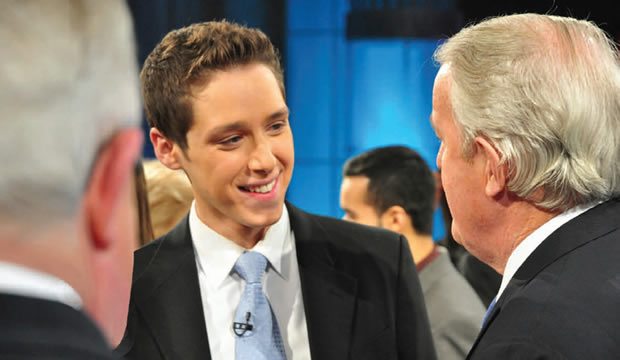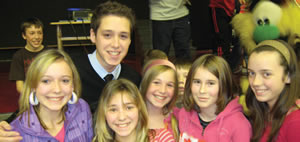Lights, Cameras, Action!

One of the first things you notice when you meet Robert Marsh, BCom’07, is his strong handshake – which is definitely a good thing. Because if there’s anything the top-four finalist in the ‘Canada’s Next Great Prime Minister’ contest needs to go with his winning smile, great ideas and healthy dose of charisma, it’s a good handshake. “I’ve been perfecting it,” laughs the Dartmouth, NS, native. “Actually, I have to give credit to the Commerce communications class that taught us a strong and firm handshake was important.”
His handshake got a workout during his four years at Queen’s when he packed his schedule with such extracurricular activities as Class President, Q'BET Co-Chair and ICBC’s winning debater. Another lesson learned was the importance of giving back. “Receiving one of the Donald and Rob Sobey Atlantic Scholarships made it possible for me to attend Queen’s in the first place,” Robert explains. In fourth year, he ‘paid it forward’ by co-chairing the class gift campaign. As class valedictorian, he delivered an impassioned address that convinced many present that his future held something special.
“Brian Mulroney Told Me... You Have To Make Very Difficult Decisions And People Are Often Going To Dislike You At The End Of The Day.”
Perhaps that oratorical success piqued his interest in entering the Next PM contest last fall. Busy with a new non-profit called S-Drive that creates social networking events, volunteer activities and professional development opportunities for a membership base of driven young professionals, plus working full-time as a financial institution underwriter for Chubb Insurance Company of Canada in Toronto, he worried he had too much on his plate to enter. However, adhering to the old adage ‘If you want something done, ask a busy person,’ Robert jumped in.
The contest began in 1995 as an essay competition sponsored by Magna International Inc., but it’s been running on CBC-TV since 2006. It has evolved into a series of challenges for contestants aged 18 to 25 – videos, online questionnaires, town hall events and ultimately an all-candidates debate, just like a real election. Two other sponsors have joined Magna: the Dominion Institute and the Canada-U.S. Fulbright Program. The grand prize is $50,000 plus a paid internship with each of the sponsors.
Like any good politician would, Robert created a “campaign team”, in his case comprised of three former Queen’s classmate advisors: Brian Edge, BCom’07, Dave Connolly, BCom’06, and Austin Armstrong, Artsci'07. His entry video showed how he would improve Canada politically, socially and economically. The next steps included answering questions on the CBC website and creating a community event designed to showcase leadership abilities. As his event, Robert chose to replicate the competition itself on a smaller scale at his old junior high and high schools in Dartmouth.
He particularly enjoyed that phase because he’s so passionate about the importance of involving young people in the political process. Not only did he love hearing the students’ views on the issues, he loved their enthusiasm. “When we offered them photos with me, they basically engulfed me. They added me on Facebook. I got to feel like Barack Obama for about two hours.”
On January 15, the number of contestants was whittled down to the final ten, one chosen by online voters and the other nine by a judging panel of sponsors and CBC representatives. Robert says the voting had come to feel like a real political campaign. “Everyone from my grandfather out at Tim Hortons in Cape Breton to my friends in Toronto helped me out. It was as if I really was running to be Prime Minister.”When he used the Alumni Notes of QSB Magazine’s previous issue to promote his candidacy and ask for alumni support, that resulted in more votes, he says. Robert garnered the most votes in that round – his “golden” ticket into the top ten, as he calls it.
“Everyone from my grandfather out at the Tim Hortons in Cape Breton to my friends in Toronto helped me out.”
 Rob visits Erin Graves Memorial Junior High School to solicit hometown support Next came a political boot camp in Toronto to test contestants’ political skill and general savvy. “The first day, they told us we’d be getting started at 9 a.m., but they came over at 7 a.m., woke us up with the cameras and started filming. We were given an envelope containing the details of our first challenge – a hypothetical terrorist attack on the West Coast. We had an hour to get dressed, get to the CBC studio, and address the nation as Canada’s Prime Minister in a mock press conference.”
Rob visits Erin Graves Memorial Junior High School to solicit hometown support Next came a political boot camp in Toronto to test contestants’ political skill and general savvy. “The first day, they told us we’d be getting started at 9 a.m., but they came over at 7 a.m., woke us up with the cameras and started filming. We were given an envelope containing the details of our first challenge – a hypothetical terrorist attack on the West Coast. We had an hour to get dressed, get to the CBC studio, and address the nation as Canada’s Prime Minister in a mock press conference.”
The boot camp was gruelling. “There were ten people who were very ambitious, very politically savvy. We got along well, but we were debating our hearts out, knowing that only four people would be chosen for the televised final.”
Those four were Robert, Amy Marlene Robichaud, David Suk and Gabriel Bran Lopez. For their final challenge, they taped a debate before a live studio audience with four former prime minsters – Kim Campbell, Brian Mulroney, Paul Martin and Joe Clark – and moderator Alex Trebek. As Robert recalls it, “They each seemed to have an aura around them.”
Not only was Robert able to test his political acumen in front of a national audience, but he picked up tips from four former PMs who really know the job. For instance, “Brian Mulroney told me one of the big things with true leadership was that you have to make very difficult decisions and people are often going to dislike you at the end of the day.” Being knowledgeable about these PMs’ policies and opinions might have tempted Robert to formulate his answers to accommodate their views, but he didn’t. “I decided early on that I couldn’t change my ideals. I knew there would be things people wouldn’t agree with or that might make the politicians a little harder on me, but if I said something that wasn’t true to what I believe, all the people who voted for me and told me to enter this competition would call me on it.”
Robert Had One Hour “To Deal With A Hypothetical Terrorist Attack On The West Coast.”
With his debating experience in high school and university, Robert was confident about the televised final, but admits it was still a bit daunting. It reassured him to know that even if the PMs were tough and disagreed with him, the viewers would have the final say. “It was ultimately democracy that would prevail,” he said, “and Canadians who would choose Canada’s Next Great Prime Minister.”
The show was taped in February, widely promoted by the CBC and finally broadcast on March 18. An enthusiastic crowd of friends and supporters gathered at a downtown Toronto bar to cheer for Robert. The vote was close, with Robert receiving 37 percent and winner Amy Marlene Robichaud 50 percent. As one of the four finalists, Robert receives $5,000 and optional month-long internships with each sponsor. But there’s a bigger prize for all the contestants: a taste of political life that might nudge them to go for the real job someday.
It’s a good thing for Robert that he’s already got that handshake down.
